Agent experience is one of those things that often get kicked to the curb. But all too often, this is a mistake that has an overarching impact on brand reputation.
You see, agent performance is directly connected to customer satisfaction. But without the right environment, agents can’t deliver the support customers need.
This article will explore the essence of agent experience. What it is, why it matters, and where to start.
What are the pillars of agent experience?
In short, agent experience is a strategy designed to support and bring satisfaction to each agent in your support team.
Chief Support Officers may be responsible for creating the vision for your company’s agent experience, but at the end of the day, it’s the team leads who truly own this task.
Indeed, team leads, and other managers, are called on to deliver an empowering environment for their agents.
Each of the pillars below describes the overall feeling that someone with a positive agent experience achieves. But they cannot do it alone. CS leaders will need to keep these pillars in mind as they work alongside their agents.
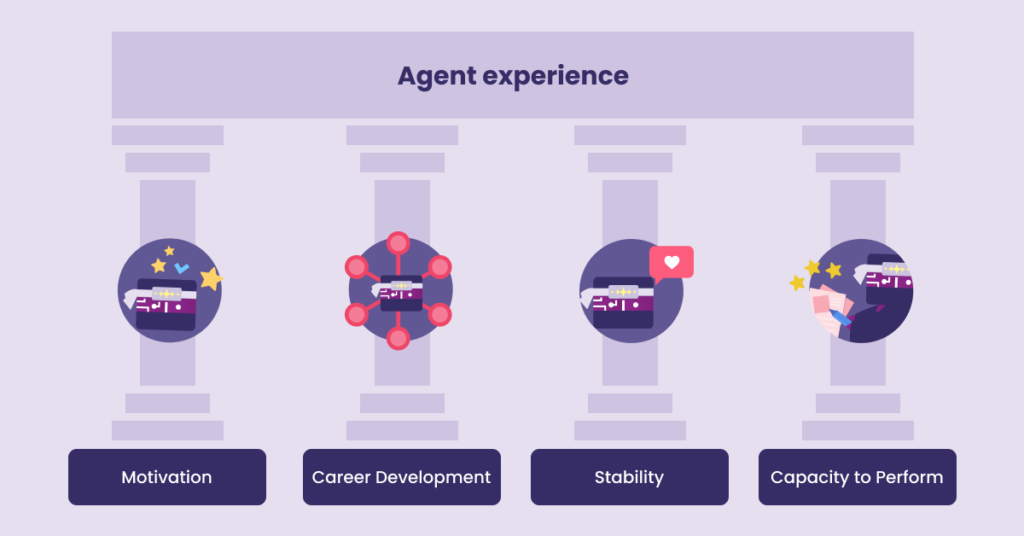
Motivation
Motivation is that mysterious “something” that pushes us into action. There are two ways to think about customer service motivation.
Intrinsic motivation is how we describe the drive to do something for the satisfaction and pride that comes from doing it well, it comes from within. Extrinsic motivation, on the other hand, drives people to take action for a reward or to avoid consequences. It is, therefore, dependent on external stimuli.
While intrinsic motivation is more sustainable, extrinsic motivation like rewards and competition surely has its place in the agent experience equation.
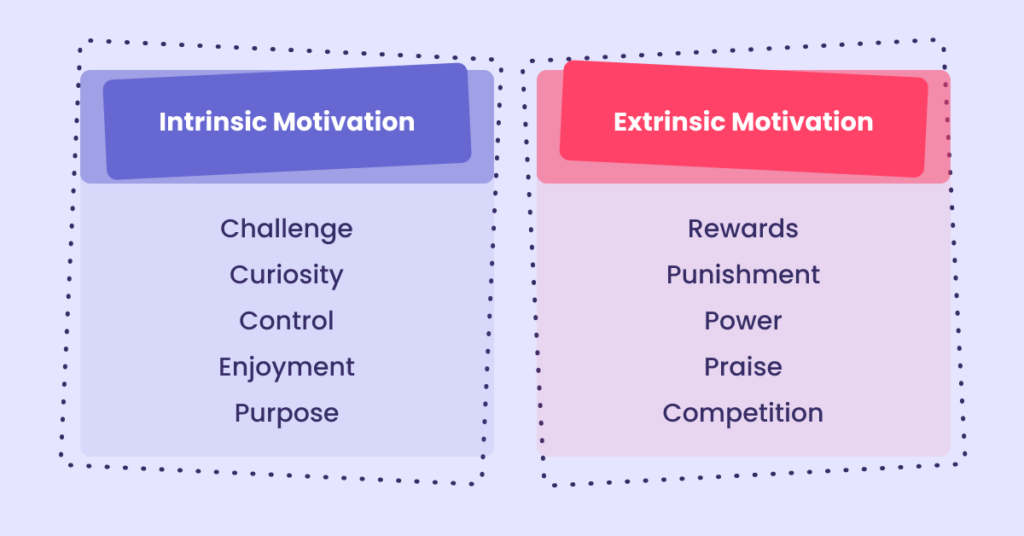
Career Development
While business leaders typically have the opportunity to chime in on this issue, we at Kaizo do everything we can to empower agent voices. Last year, we decided to ask over 250 support agents to share tales of their own agent experiences.
Customer service agents are typically entry-level positions. This means the job can attract people with little work experience who are searching for an attainable job later in life.
However, according to our Agent Empowerment Report, a large proportion of agents in customer support find that their natural aptitude for problem-solving and service-mindedness make a career in customer service appealing.
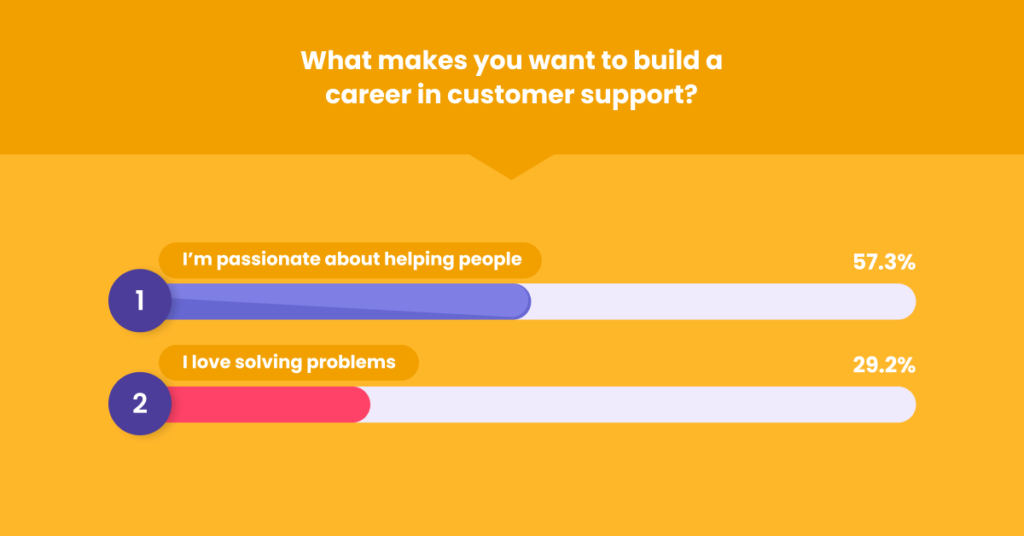
Ambitious agents like these are constantly skilling up as they seek out opportunities to move from a role delivering customer service towards designing it.
Agent experience is supported by a clear and communicated roadmap toward career development. Knowing that an agent’s work truly pays off – laying the foundation for their future – can be a serious boon to agents stuck in the day-to-day of their work.
Stability
A stable workplace environment is built with intention. Sure, some aspects of company culture can grow naturally. This is what makes every workplace unique.
However, functional workplaces have reliable leadership and accurate workforce management. Not to mention documented quality assurance procedures for every team member to follow.
Creating long-term job satisfaction via customer service agent experience requires a level of stability that only an organized workplace can deliver. Keeping your support operations organized, predictable, and easily understandable is crucial to building strong teams and retaining talent.
Important to note, an out-of-control workplace is de-motivating for agents. While every customer interaction is unique, the processes agents follow are routine. Agent experience falls apart when these predictable systems aren’t maintained.
Information is lost, metrics aren’t tracked, and performance suffers.
At the end of the day, no one is happy. Not your agents and certainly not your customers.
The capacity to perform
Agents can only thrive if business leaders prioritize each and every pillar. That means providing your agents with the tangible materials they need to do their jobs well.
The secret to an effective agent experience program is improving the digital capacity of your employees. Providing simplified workflows across interfaces, protected servers, and helpful apps can lift the burden of manual ways of working.
An agent’s experience can suffer if they do not have the resources they need. Agents need an integrated server, internal communication channels, up-to-date knowledge bases, and a comprehensive overview of customer data.
At the end of the day, this is what can impact your employee experience in big ways.
What impact can agent experience really make?
The business case for prioritizing customer service agent experience has skyrocketed in the past few years. Yes, happy agents convert happy customers. But if your agents are dissatisfied, the risk of accruing operational costs increases and the company starts to crumble.
Poor agent experience is simply unsustainable. These top arguments for agent experience will change the way you think.
Weathering any storm with resilient systems
According to Workday, 70% of organizations with mature employee experience strategies were able to return to their pre-pandemic growth trajectories in under a year.
Designing agent experience is very similar to having effectively designed infrastructure. City planners think about factors like traffic flow, dangerous weather, and creating a satisfying city environment. Yes, city planners are responsible for building environments that spark engagement and healthy life. But the most important, and least recognized, part of their job is to make our systems disaster-proof.
Agent experience is not only about meeting basic needs or keeping our agents happy. These are certainly important for agents to have a good experience at work.
However, as we’ve all recently learned, creating resilient systems and processes can make or break how teams work under stress. Call centers should be doing whatever it takes to ensure that agents feel in control and empowered to provide support, even in the most unpredictable times.
Satisfied agents lower operational costs
According to Customer Experience Magazine and Aberdeen research:
- 59% of agents lack the knowledge to provide better service.
- agents can spend 15% of their time trying to find information that supports their daily tasks.
- 72% said they wish it was easier to access customer information in their customer service tools.
What’s worse, centers with 200-plus agents can experience as much as $1.5 million in operational costs per year.
This is precisely why streamlining your agents’ digital capacity is a pillar of agent experience.
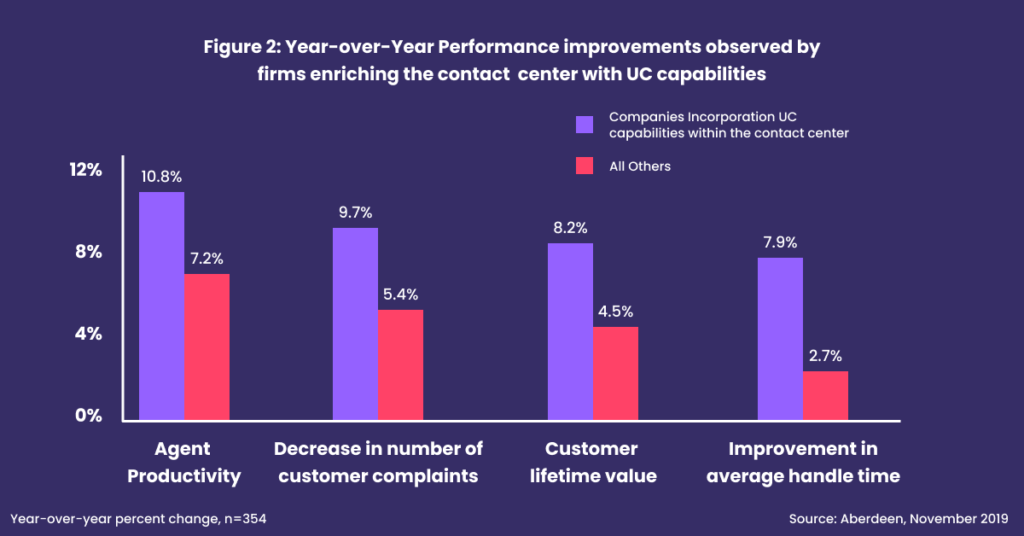
5 ways you can improve agent experience
Despite the known benefits, agent experience is significantly de-prioritized in call centers. Call centers typically give priority to speedy service, saving money, and delighting customers over agent happiness.
The industry has been like this for so long that caring for employees fell by the wayside. Until the pandemic changed everything about the way we work.
Here are 5 practical ways to improve agent experience today.
1. Be the leader your agents need
Positive agent experience starts and ends with the leaders they work with.
Having a positive connection with workplace superiors can increase feelings of security and empowerment.
Team Leaders should be creating systems to ensure they stay readily accessible to give agents the guidance, reassurance, and support they need. It may seem counterintuitive but building a relationship with agents can be operationalized.
Insight from our own Agent Empowerment survey shows that agents are actually eager to spend more time consulting with their team leads. Our results show that agents feel empowered when they receive regular feedback.
Here are the practical and emotional benefits to agent experience when your team gets regular feedback.
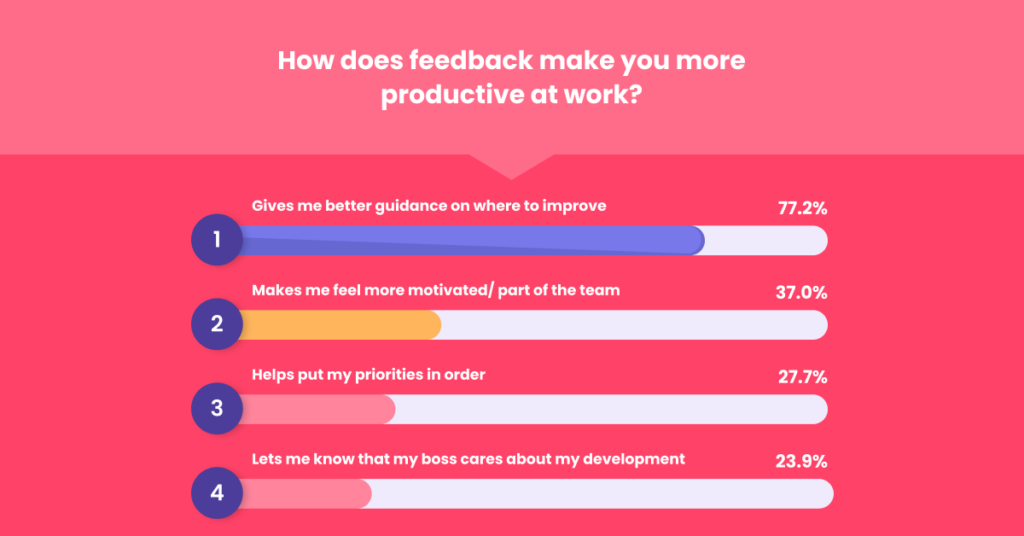
2. Capture coachable moments
Despite the fact that workplace learning is experiencing a major boom, leaders are struggling to find the right way to go about it.
Ryan Roslansky, CEO of Linkedin, can see this trend clearly. As the leader of the world’s largest professional networking platform, Roslanky gives his insights on how skills-based training can connect employees to their future goals.
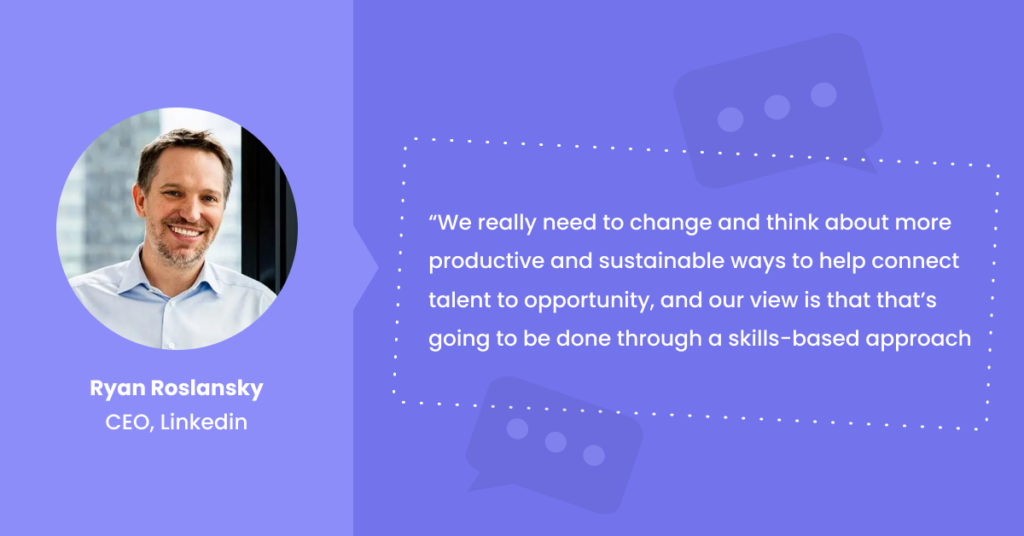
We need to see call centers create more robust, sustainable programs by connecting skill-building to their future career in customer service.
With this in mind, Kaizo sought to provide an integrated training and development solution that works with agent empowerment, not against it.
Coaching for career development means creating consistent, continuous opportunities to give feedback. Call centers can achieve maximum impact with minimal effort using integrated QA and coaching systems.
Kaizo’s solution is to offer users a two-for-one package – connecting the data from QA Scorecards and re-mixing them into Coaching Cards. Having access to their own performance data allows agents to bring their own goals into feedback sessions.
Breaking down data silos and creating an excellent agent experience go hand in hand. As the saying goes: Information is power!
3. Make learning fun with gamified Missions
Unfortunately, customer service departments often rely on punitive methods. However, highlighting mistakes can create a culture of fear around performance reviews and feedback.
That’s why Kaizo introduced gamification elements into our products. Gamification can help agents and managers deal with challenges by creating experiences that break up the day with mini-quests for success.
Stagnation can be demotivating; when you start associating work with their lack of progress, agent experience suffers.
Kaizo Missions create personalized experiences for each and every agent in your team. When leads deploy their weekly Missions, your agents receive time-bound challenges that correspond with the goals leads and their agents create side by side.
Ultimately, our goal is to design solutions that enhance the customer service agent experience. We want agents to feel empowered by their efforts to improve – investing time to accomplish their goals.
4. Break data barriers
According to Betterwork, breaking data barriers creates transparency and empowerment in the workplace.
Agent performance metrics are typically squirreled away by managers who assume displaying the information would de-motivate agents. Within this framework, team leads and QA experts will conduct all their evaluations privately, approaching each agent with a list of improvements to make.
However, lack of transparency is actually an indicator of organization-wide distrust and poor agent experience.
Indeed, transparency builds trust – especially when it comes to their own performance data. Allowing agents an appropriate level of access to data empowers them to create performance goals on their own terms, matching them to KPIs and positioning themselves as valuable employees.
5. Let your agents lead
When trust is restored in call centers, agents can be the master of their days. Gaining control in life and work triggers the intrinsic motivation to excel in the ways we want.
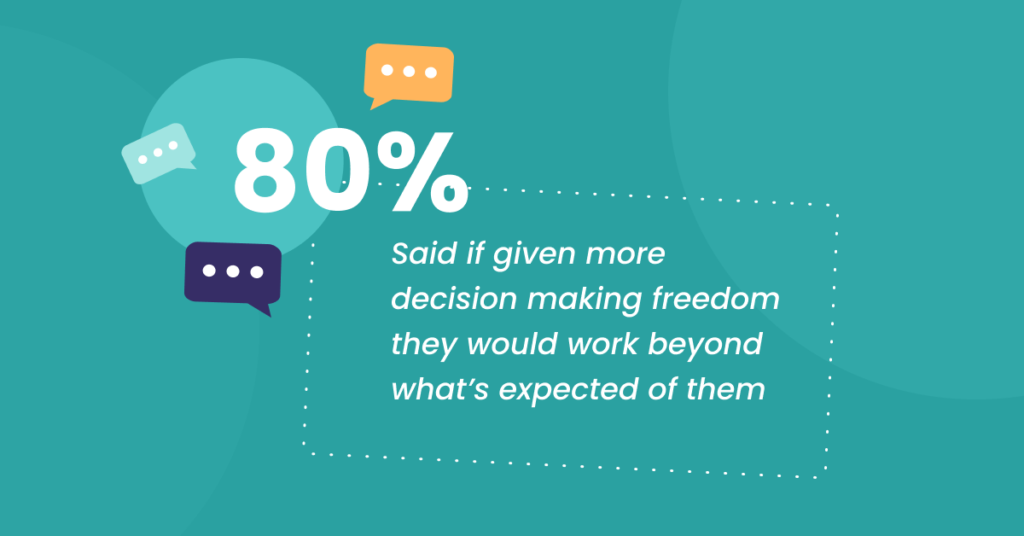
Surprisingly, freedom at work became a theme in our Agent Empowerment study.
It seems that micromanaging brings about a negative customer service agent experience. One that stifles a level of creativity and growth that would ultimately benefit your call center performance.
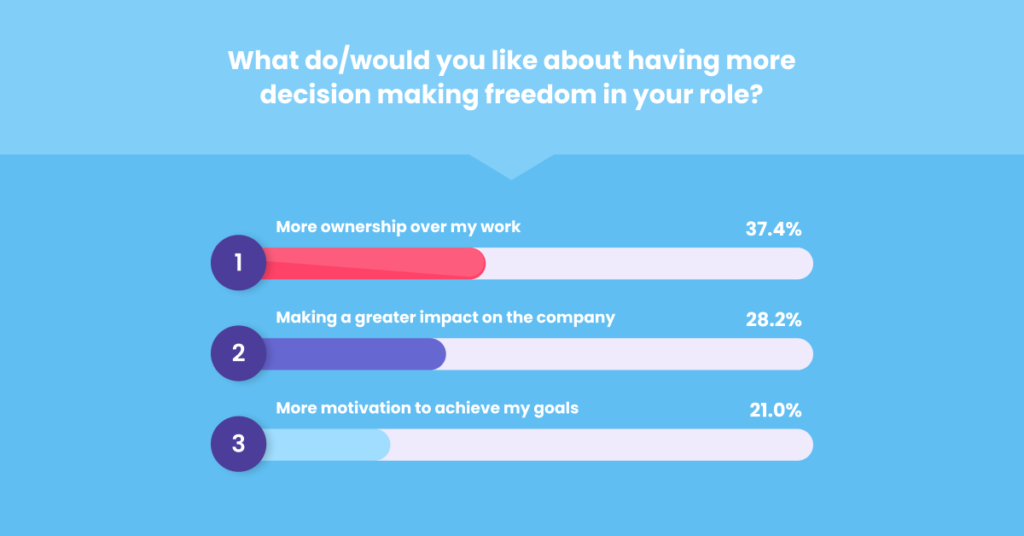
Closing thoughts
After all that information, perhaps it’s time to apply what you’ve learned.
- How empowered, satisfied, efficient, and productive are your support agents?
- Have you made an effort in educating your agents about their future in customer service?
- Do the systems and processes in your call center create a stable workplace?
So, we’ve made our argument for improving agent experience.
Now it’s your turn to take action, and don’t forget to let us know how it went!


